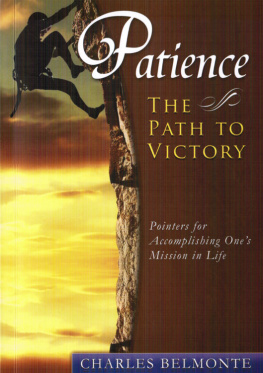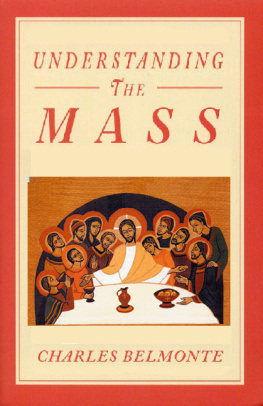Patience:
The Path to Victory
Pointers for Accomplishing Ones Missionin Life
Charles Belmonte
Copyright (C) 1994 by THE AUTHOR
NIHIL OBSTAT: Msgr. Benedicto S. Aquino
Vice-Chancellor
IMPRIMATUR: +Jaime L. Cardinal Sin
Archbishopof Manila
ISBN
Nada te turbe,
Nada te espante,
Todo se pasa,
Dios no se muda,
La paciencia
Todo lo alcanza;
Quien a Dios tiene
Nada le falta.
Slo Dios basta.
Let nothing trouble you,
Let nothing scare you,
All is fleeting, [All things pass]
God is unchanging.
Patience
Gains everything.
He who possesses God
Lacks nothing.
God alone suffices.
St Teresa of Avila
TABLE OF CONTENTS
Part One
THE THEOLOGY OF PATIENCE
Part Two
THREE DOCTORS OF THECHURCH SPEAK ON PATIENCE
Part Three
POINTERS ON PATIENCE
Preface
Everyman is a wayfarer travelling to his final destination. When you reach yours,you will have succeeded. In the title of this book I mention victory; I hope you get some ideas fromthis book that will help you to reach that destination. But real victory orsuccess has nothing to do with material achievements: what you gain in life oraccomplish yourself. Success is what you do for others, what you do for God.
Iallude to a path in the title of thebook. You dont accomplish your mission in life by just turning on a switch;you dont succeed by merely making the right decision once in your life time.That is the mistake of those who choose-Jesus-as-my Savior and forget about himor their neighbor afterward, of those worried about choosing the right husbandor wife, or professional orientation as if were the end of their struggle.Victory is at the top of a tall building. And there is no elevator to victory;you will have to take the stairs, step by step.
Thevictory you try to get will come only after a path. You will find difficulties,but remember, in this life, like in sports, one loss does not make a season.You must go along a long drive strewn with hopes and fears, satisfactions anddisappointments, joys and suffering. You will tread that path going througheach of these elements. Yet, you must set your eyes in the final goal, rejectany sadness resulting from these hardships, and continue fighting. When you dothat, you are living the virtue of patience.
Everybodygoes through bad times in life. Some end up bitter,you, with patience, should get better.
Youwill find in this book guidance from many persons who went (or are still going)through obstacles similar to yours. Their suggestions and encouragement willhelp you to go on, without hurry, without pause, without flagging down in thestruggle to reach your destination.
Thisis not a book to be read through once; it is to be taken over and over again.It is a book for daily reflective and meditative prayer. It is a dailycompanion that will support your effort to acquire solid virtue.
Butfirst invoke the Holy Spirit. Ask him to make you understand his words, noticehis touches, and follow his mysterious ways. Then read, reflect, move on, andcontinue your conversation with God daily.
Atthe end you may see light, and that light will lead you to God who is Truth andLove.
PART ONE
THE THEOLOGY OF PATIENCE
The Place of Patiencein Christian Life
OneWill always Encounter Trials in Life
WritingTimothy from his prison in Rome where he will soon suffer martyrdom, the Apostle St Paul warns his disciplethat everyone who wants to live a holy life in Christ Jesus will bepersecuted (2 Tim 3:12). In the same letter he points out, I am alreadypoured out like a drink offering, and the time has come for my departure (2Tim 4:6). And he adds with holy pride, I have fought the good fight, I havefinished the race, I have kept the faith (2 Tim 4:7).
St Paul was thus advisinghis disciple on an ordinary occurrence in the life of a Christian: trials.Christ himself had prepared the apostles: In this world you will have trouble.But take heart! I have overcome the world (Jn 16:33).
Inspite of his own weaknesses and the opposition from without, a Christian entersthe daily struggle full of joy, notpassive or frightened; he considers himself a winner in Christ. Thus, St Jamesbids, Consider it pure joy, my brothers, whenever you face trials of manykinds, because you know that the testing of your faith develops patience.Patience perfects the work [of God] so that you may become mature and complete,not lacking anything (Jas 1:2-4).
What Is Patience?
Whenwe hear about patience, we usually think of one of those situations that getinto our nerves: I really have to be patient with this person. We arethinking of patience as some sort of controlover the irritation and anger we experience when we face people who dosomething wrong or inconvenient for us. In sum, we think of patience as somesort of serenity: the power of enduring trouble, suffering, and inconvenience,without complaining.
Orwe might think of patience as some capacity tobear the delay of goods which do not come as fast as we would like: I haveto be patient before I save enough to buy a car. This notion refers to thecapacity to bear sacrifices for a long time until we attain a certain joy. Patiencehere appears as the ability to wait for results, to deal with problems withouthaste.
False Attitudes toSuffering
Certainserene attitudes towards suffering are not to be confused with the genuinevirtue of patience.
The stoic attitude is one of endurance butonly because it considers suffering inescapable no matter what you may do.
The Buddhist attitude is one of eliminatingsuffering by killing any desire and thus any frustration or suffering.
Theattitude of apathetic inertia is thatof the lukewarm person who prefers to remain in his situation because he thinksthat any change will demand some effort or that he might end up in a worsesituation.
Besides,we find an array of attitudes that are products of too much love of comfort orlaziness. Instead of abandoning oneself to Gods providence, the person merelywaits for the suitable moment to seek revenge or his own personal affirmation.In these cases, egoism and pride have taken the place of humility, thecharacteristic of true patience.
Theseand other attitudes lack something to make them virtuous the subject does notendure suffering for the sake of an objective good, which is the goal of anyvirtue.
Patience as a HumanVirtue
Froma humanpurely ethicalpoint of view, patience is necessary for any person; itseems logical that we should bear difficulties to compensate for the evil wehave done. But this motive is not allabout patience.
Weread in the Book of Proverbs that better a patient son than a strong one, andhe that is master of his will is better than he who is the conqueror ofnations (Prov 16,32). Here patience is related to self control and will power.
Definitively,patience has to do with suffering. If we want to advance a definition of it asa human virtue (that is, without any relation to God or the influence of hisgrace in our life), we could say that patience is the capacity or habit ofenduring evil, adversity, or pain with fortitude. In fact, the classics placepatience as part of the virtue of fortitude.
Next page













